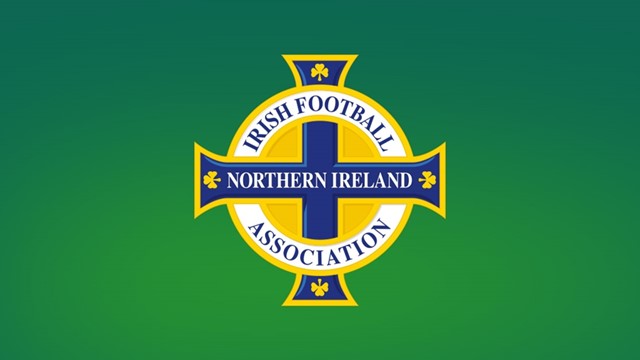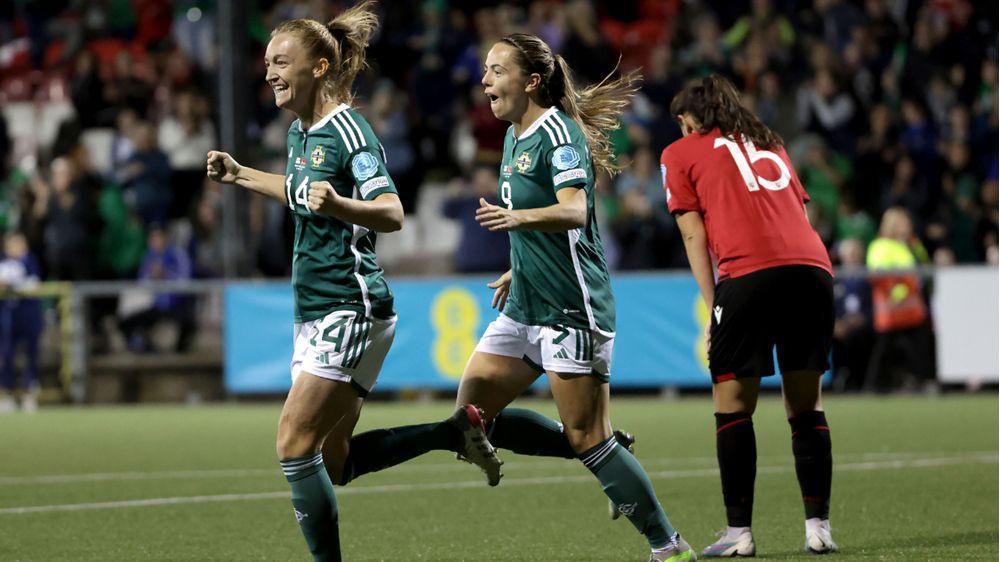
Do you ever get that feeling that you have forgotten something but just can’t remember what it is? This feeling of looming anxiety clouded my mind during my first filming opportunity with the Irish Football Association. Although the location for the shoot allowed me to develop my camera and sound operating skillset; it might be beneficial to reflect upon the event; as some believe that it “…helps develop an understanding of difficult work situations, improving professional practice” (Cottrell, 2023: 219). For this reason, I will be using the Boud et al model of reflection, in order to determine what happened, where I went wrong, and how I can learn from this experience to better prepare myself for future projects.

The Moment of Realisation
On my first day with the I.F.A, I arrived at Seaview Football Stadium for the Northern Ireland Women’s game against Albania and was instructed to get B roll footage of the stadium, players, and fans. I felt like this was a lot to ask an intern to undertake for the first time; however, I complied, because I was determined to capture good footage and prove myself to the Association. Like any other event I had previously covered, I began shooting – getting good reactions from the crowd and simple shots of the footballers. Whilst filming, I had noticed that only one of the stands was full of fans, causing some sections of the footage to appear empty. This provided me the opportunity to implement some of the camera tricks I had learned in previous years at university; one of which was forced perspective. This filming technique displays how “relative size is a component of many optical illusions and a key compositional element in manipulating the viewer’s perception of the subject; it can be used to focus the viewer’s attention on important elements” (Brown, 2011: 42). This allowed me to fill the remaining seats by shooting a subject in front of them, thereby disguising the lack of people and creating the effect that the stadium had more fans present. However, it was at this moment that a problem arose during the efficient shoot – as I noticed the two flashing symbols – that no camera operator wants to see, indicating the camera’s battery and SD card were both running low. In my nervous mindset of the night before, I had forgotten to pack spares with the rest of my equipment. With this pressing issue at hand, I knew I should have spoken to the lead videographer, Andy, and asked if he had any equipment I could borrow. But alas, I was too nervous as this was my first shoot and I didn’t want to get off on the wrong foot by appearing unprofessional to the illustrious I.F.A. With the battery getting lower and the game progressing, I used my problem-solving skills to make the best of the situation. I began to delete any unusable footage from the SD card and record on a lower video format in order to save file space; this resulted in a slight difference in quality, but nothing notable unless highlighted. As for the battery issue, I decided to turn the camera off when the crowd went quiet, most notably when Northern Ireland were defending. These ideas, thankfully, lasted me the full way through the shoot (covering pre-match, the game and post-match). Overall, it was a mixed day of emotions, as I was glad I had the opportunity to shoot with the organisation and display the quality of work I can produce, however, there are a number of issues that I could improve upon.

Well, what can I do about it now?
Upon reflection, there were many positives and learning opportunities from this experience. First, I realise it would have been more beneficial to have come clean to the lead videographer and ask if he had a spare SD card and battery. Although the footage appeared usable, I think that it could have been a lot better, as I know that these minor changes can create a better overall product. After the game, I told Andy about the issue and he assured me that there was no pressure on my work or asking for help, as they acknowledged that I am still learning in these practical experiences. Prior to this comment, I thought that I was letting the company and myself down; yet I realise now that my work won’t become professional standard overnight, which is why it is important I learn from these situations by asking for help. In fact, it could be understood that “the skills of reflective practice, together with the practical skills …learned during the foundations of your professional education, will stay with you, becoming part of who you are as a practitioner” (Jasper, 2013:2). Furthermore, I often worry that I will be perceived as “a new kid on the block know it all” to other people when speaking my mind, especially if I think I can improve the quality of a project. However, Andy also made it clear that the I.F.A. are open to new ideas and concepts, meaning the worst that they can do is say no. I hadn’t thought of it in this way before, as there was nothing to be ashamed of when bringing new ideas to the table or attempting to improve aspects of filming. Now I understand that asking questions may allow me to gain more knowledge on the industry, as I will be learning about the inner workings of content creation throughout this placement. Another issue that should be improved upon is my organisational skills, as this lack of preparation regarding my equipment caused a major issue when filming, forcing me to alter factors of my shoot. This was unusual for myself, as routinely I am prepared for any filming conditions days prior. With this in mind, I think it was a case of “the first day jitters”, as I was so worried about what could go wrong, I ended up causing my own problems. However, I think this issue will be resolved through practice and gaining confidence, as I will grow into this work environment. On a more positive note, I’m impressed that I was able to use the knowledge I had gained from university to improve my filming skillset, as this was the first time that I was able to put my education into practice. This also made me confident when filming, as I acknowledged that I knew how to tackle this issue, thanks to my film practice workshops.


Fully Charged and Ready to Go
Moving forward, there are a number of ways in which I will prevent these issues from recurring. First, I must be more confident when asking for assistance, although this experience was intimidating, I now understand that the I.F.A. aren’t expecting high-level videos and will, therefore, anticipate that these problems could occur with students who have little practical experience. This has provided me with clarity on how to approach someone when asking for help, as I know that they are willing to assist with such issues. In fact, the whole concept of this module is to learn from professionals so we can improve our skillsets, which often requires asking a question or further assistance. Upon reflection, I now understand that this is nothing to be nervous about. This is also the case for discussing aspects of the shoot, as although I will work hard to meet these professional standards, I must also speak up when I have a new idea or think I won’t be able to accomplish a task. I understand that communication is often a key element in group assignments, as it allows workers to better understand what each other are doing and how they are managing this task. With this in mind, I think that, in time, my confidence will grow to the point where I can state these opinions and ideas for content creation, thus allowing me to contribute more to each project. Furthermore, discussing my workload will allow my employer to grasp how efficient I am at tasks, therefore, allowing them to teach me how to improve and adapt to the differences in workloads from university to a full-time job. As for my filming equipment, it would be useful lesson to double-check that I have everything packed and charged the night before filming in order to prevent these issues from recurring. Andy highlighted that he previously had a similar issue and suggested that I create a checklist to record the status of my equipment. I believe this would be beneficial, as it will allow me to visually comprehend where everything is and prevent items from being forgotten.
Overall, this placement module has allowed me to better prepare for full -time work once I have finished my university degree, as it highlights what issues can be made, but (more importantly) how I can move forward and learn from these experiences. This filming opportunity has also assisted my confidence, time management and communicational skills, as I now have a better understanding of a filming environment and what is expected of me, like bringing a spare SD card and battery.

Refrences
Images
[1] Irish Football Association (2023), Intermediaries. Available at: https://www.irishfa.com/irish-football-association/intermediaries (Accessed: 15th November 2023)
[2] Prilla, M, Blunk, O and Chounta, I (2020), How Does Collaborative. Reflection Unfold in Online Communities? An Analysis of Two Data Sets. Available at: https://link.springer.com/article/10.1007/10606-020-09382-0 (Accessed:20th November 2023)
[3] Black, J (2023), Women’s Ticket Promo. Available at: https://www.youtube.com/shorts/x3m90U7BxMM (Accessed: 15th November 2023)
[4] Irish Football Association (2023), Northern Ireland Women Register Win Against Albania. Available at: https://www.irishfa.com/news/2023/september/northern-ireland-women-register-win-against-albania (Accessed: 15th November 2023)
[5] Vector Stock (2020), Effective Communication. Available at: https://www.vectorstock.com/royalty-free-vector/effective-communication-vector-28926508 (Accessed:20th November 2023)
[6] Youth Employment UK (2016), Organisational Skills- An Overview. Available at: https://www.youthemployment.org.uk/organisation-skills-overview/ (Accessed:20th November 2023)
[7] Deposit Photos (2013), Remember Stock Photos. Available at: https://depositphotos.com/photos/remember.html (Accessed:20th November 2023)
Bibliography
Cotrell, S. (2023) Critical Thinking Skills: Effective Analysis, Argument and Reflection. Fourth Ed. Queens Library [Online]. Available at: https://qub.primo.exlibrisgroup.com/discovery/fulldisplay?docid=alma991008584957508046&context=L&vid=44QSUB_INST:QUB&lang= en&search_scope=QUB_Campus&adaptor=Local%20Search%20Engine&tab=QUB_Campus&query=any,contains,Critical%20Thinking%20Skills:%20Effective%20 Analysis,%20Argument%20and%20Reflection (Accessed 24th October 2023).
Brown, B. (2011) Cinematography: Image Making for Cinematographers and Directors. Second Ed. Queens Library [Online]. Available at: https://qub.primo.exlibrisgroup.com/discovery/fulldisplay?docid=cdi_proquest_ebookcentral_EBC720723&context=PC&vid=44QSUB_INST:QUB&lang=en&search_scope=QUB_Campus&adaptor=Primo%20Central&tab=QUB_Campus&query=any,contains,cinematography:%20image&offset=0 (Accessed 26th October 2023).
Melanie, J. (2013) Beginning Reflective Practice. Second Ed. Queens Library [Online]. Available at: https://qub.primo.exlibrisgroup.com/discovery/fulldisplay?docid=cdi_askewsholts_vlebooks_9781408098851&context=PC&vid=44QSUB_INST:QUB&lang=en&search_scope=QUB_Campus&adaptor=Primo%20Central&tab=QUB_Campus&query=any,contains,beginning%20reflective%20practice%202013&offset=0 (Accessed 26th October 2023).